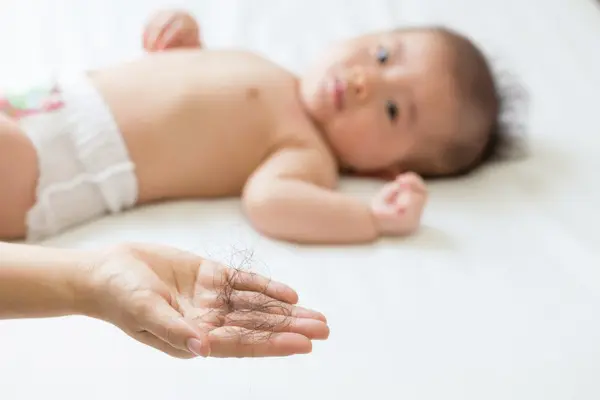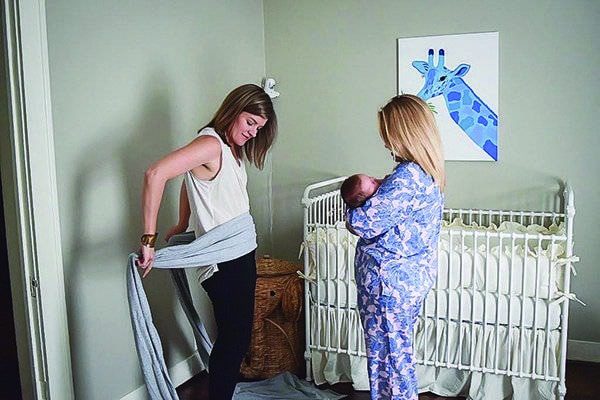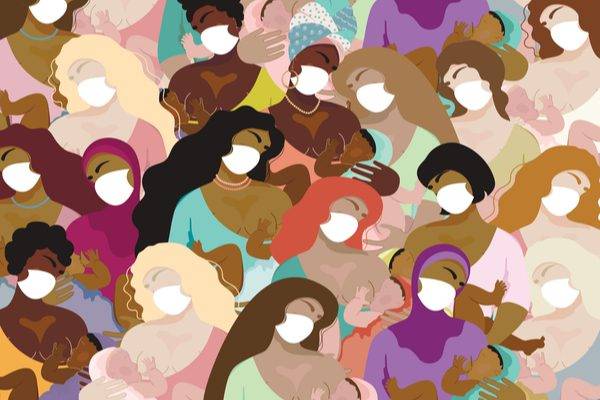Picture this: You wake up in the morning after a long night of feeding your newborn. You find a brief moment to go to the bathroom to wash your face and brush your hair. And then, panic strikes. You begin to notice clumps of hair coming out onto your brush. This can certainly cause a bit of alarm initially, but try not to panic – your hair isn’t falling out from new mother stress!
If you’re noticing a bit more hair shedding than normal after giving birth, you’re most likely experiencing postpartum hair loss which is quite normal among new moms and nothing to freak out over.
The good news? There are ways that you can help treat it and reduce the amount of hair loss. Before we get into methods to help with postpartum hair loss, let’s get down to the basics of what it is and what causes it.
What causes postpartum hair loss?
First thing’s first: Before you begin panicking at the sight of your hair falling out, remember that you just birthed a baby. Your body is going through massive changes and postpartum hair loss is a completely normal result of your hormone levels balancing out again. It’s important to understand that your hormone levels go through many changes before, during, and after your pregnancy, which can affect hair growth. Hormonal imbalance after giving birth is quite normal, with one of the main symptoms being postpartum hair loss.
Curious as to what exactly is going on with your hormones post-birth? To keep it short: a lot. But allow me to break it down. Throughout your pregnancy, your body’s estrogen levels are at an all-time high, which tells your hair follicles to enter the growing phase of the hair growth cycle – hence why you may have experienced luscious locks before giving birth. Once you give birth, your estrogen returns to pre-pregnancy levels, which sends signals to your hair follicles to go into the resting phase. And after the resting phase comes the hair shedding phase.
Keep in mind that in addition to the rollercoaster ride that your hormones are on, stress and nutrition also play a huge role in the hair growth cycle. And let’s be honest: relaxation and nutrition have probably taken a back seat, as you’re still learning to navigate your way through life as a new mother.
How long does it last?
Now onto the question that every mother experiencing postpartum hair loss wants answered: How long until it stops? Postpartum hair loss can start at any time between two to four months after you give birth. Every woman is different and, therefore, the amount of hair loss experienced among new mothers also varies. If you have thinner, shorter hair, the amount of hair loss might not be as drastic as someone who has naturally thick, long hair.
The key thing to remember is that while postpartum hair loss is certainly annoying, it does stop eventually. The duration of postpartum hair loss also differs from mother to mother. Some find that their hair growth returns to normal after four months, some after six months, and some even up until one year after giving birth. Just remind yourself that this is temporary and if you have any concerns, never hesitate to speak with your doctor.
How can you help reduce hair loss?
You now know that postpartum hair loss is normal and temporary, but most likely that won’t stop you from seeking ways to reduce the hair shedding – trust me, I get it. A healthy diet and stress management go a long way if you want to help reduce hair loss. Yes, this can be a challenge when your primary focus and concern is your newborn. But taking care of yourself will not only help in managing your postpartum hair loss, it will ensure that you are at your best and healthiest to properly care for your newborn.
Eat a well-balanced diet
Start with a well-balanced diet that includes plenty of protein. Enjoy different vegetables, whole grains, and fruits that are packed with all the vitamins and nutrients you need. A healthy diet will make you feel great and can help prevent your postpartum hair loss from worsening. You can also speak with your doctor about taking supplements to ensure that you are getting all the nutrients you need.
Stress management
Next, reduce the stress in your life. Keeping your stress levels low is beneficial to your entire wellbeing, not only your hair. Try to schedule in moments that are just for yourself. Do yoga, meet friends for lunch, and get as much sleep as you can. Don’t be afraid to ask for help from a friend or a family member if you’re feeling burned out or overwhelmed. And remember: there is no shame in taking care of yourself after having a baby.
Keep calm, mother on!
I know that losing your hair can send you into a downward spiral of panic and concern. But try not to sweat it too much. You just gave birth and your body needs the proper amount of time to adjust. So in the meantime, enjoy life as a new mother with your baby – and treat yourself to a pretty headband!



